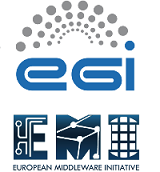Speaker
Impact
CORAL provides generic functionalities that do not specifically target the data models of high-energy physics experiments and could be used in any other scientific domain. In addition to its C++ API, CORAL also provides a Python API (PyCoral) which is particularly useful for fast prototyping of relational applications from an interactive shell.
Description of the work
CORAL supports data persistency for several backends and deployment models, including local access to SQLite files and remote client access to Oracle and MySQL servers, either directly or through intermediate server/cache layers.
In this demonstration, PyCoral will be used to show how CORAL allows users to create, populate and read relational tables.
Conclusions
In this demonstration, PyCoral will be used to show how CORAL allows users to create, populate and read relational tables. In particular, it will be shown how the same CORAL code can be used to store and retrieve relational data on the Grid using different backends, such as SQLite files, Oracle databases or the Frontier read-only servers and caches.
Overview
The CORAL C++ software is widely used in the LHC Computing Grid for accessing the data stored by the LHC experiments using relational database technologies.

